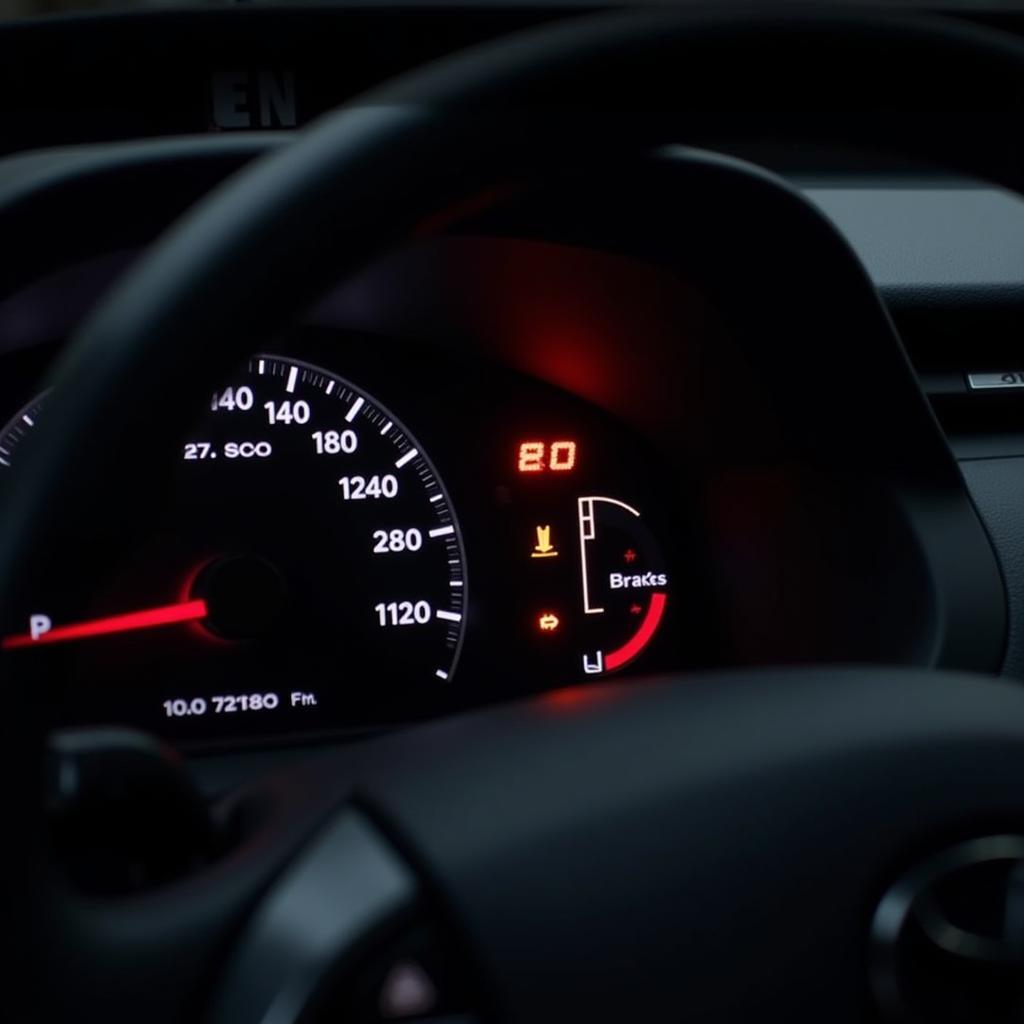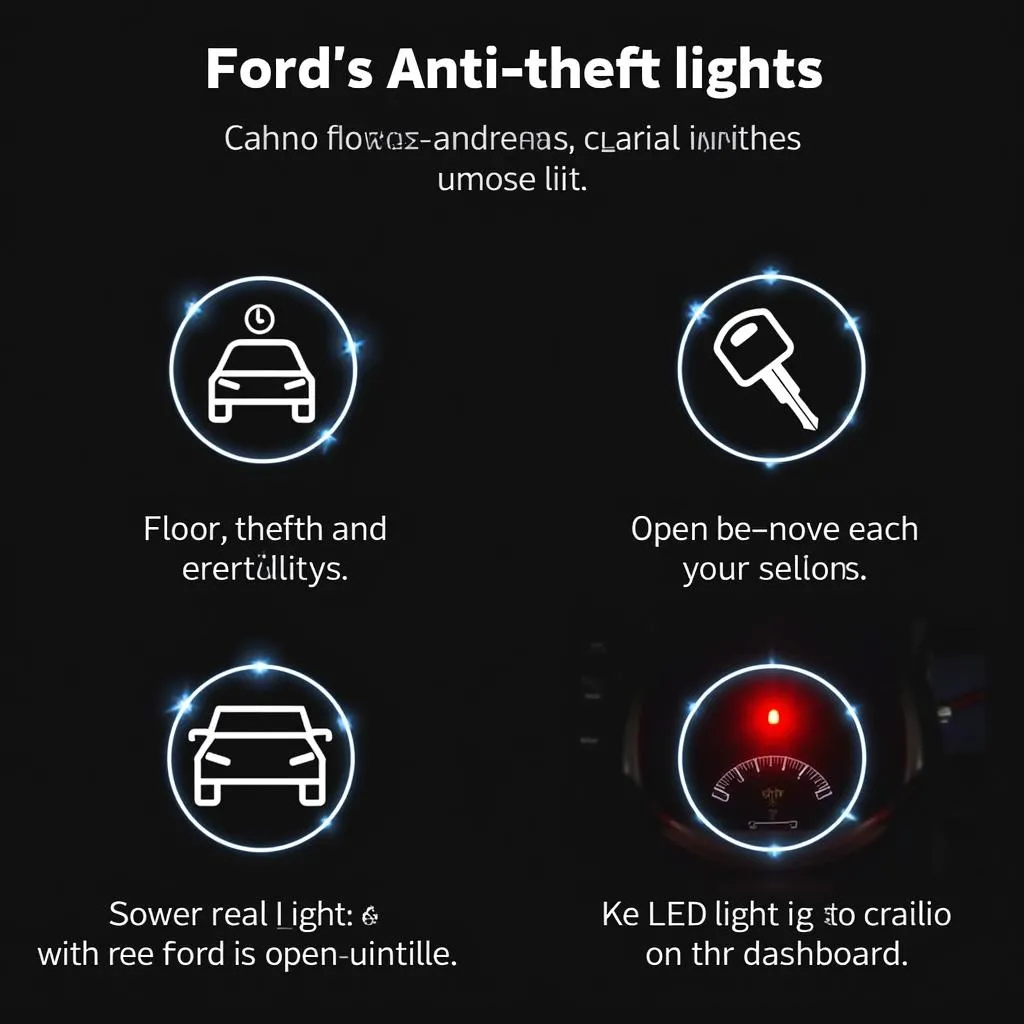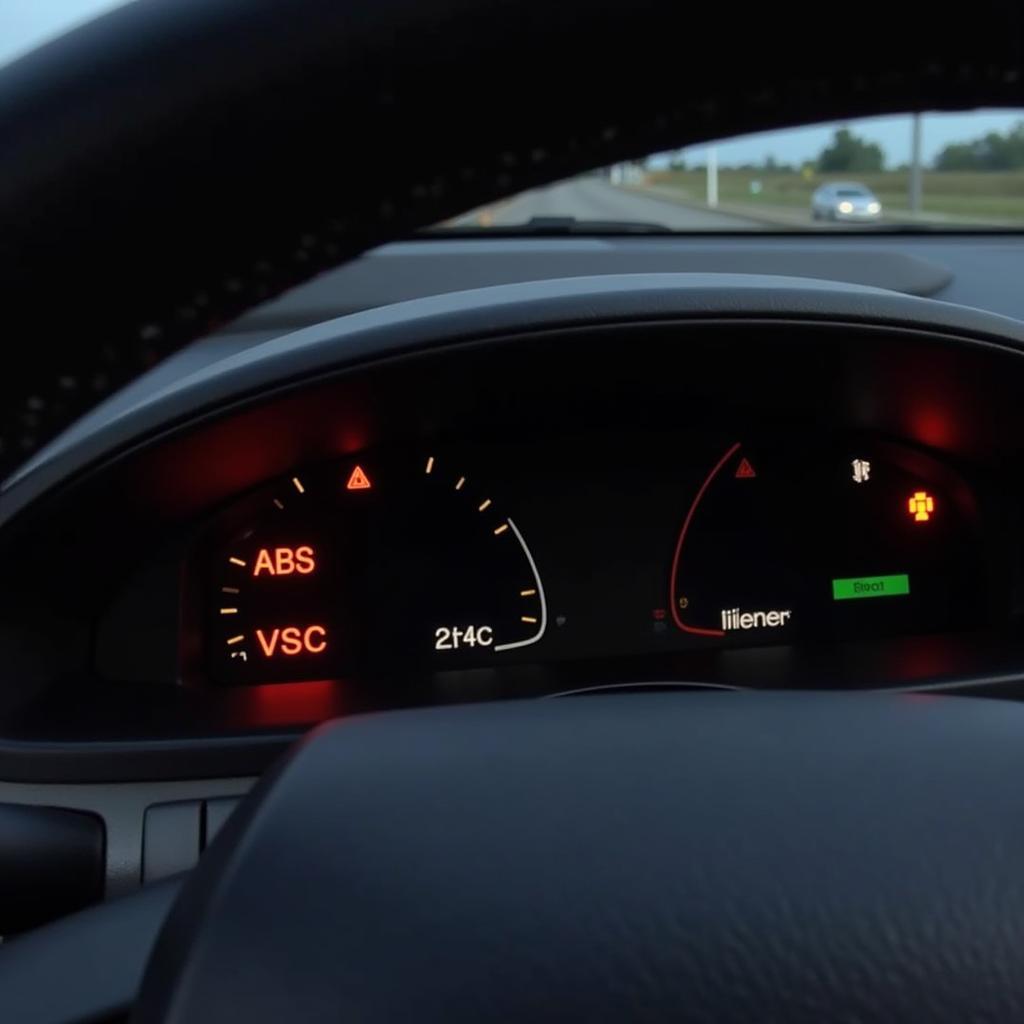The dreaded Toyota Prius brake system warning light can be a source of anxiety for any driver. Understanding its meaning and knowing how to address it can save you time, money, and potential danger on the road. This guide provides an in-depth look at the Toyota Prius brake system warning light, covering everything from common causes to troubleshooting tips and preventative measures.
 Toyota Prius Brake Warning Light Illuminated on Dashboard
Toyota Prius Brake Warning Light Illuminated on Dashboard
Understanding the Toyota Prius Brake System Warning Light
The brake system warning light in your Toyota Prius is more than just a simple indicator. It serves as a vital communication tool between your car and you, alerting you to potential issues within the braking system. Ignoring this light could lead to serious safety hazards. It’s crucial to understand that this light can illuminate for various reasons, from a simple parking brake engagement to more serious problems like low brake fluid or a malfunctioning ABS system.
What does the altima brake warning light mean? Much like the Prius, it signals a potential brake issue. Checking your brake fluid level is a good starting point for troubleshooting.
Common Causes of the Brake System Warning Light
Several factors can trigger the brake system warning light in your Prius. Identifying the underlying cause is the first step towards resolving the issue. These are some of the most frequent culprits:
- Low Brake Fluid: This is perhaps the most common reason. Low brake fluid can significantly compromise your braking ability.
- Worn Brake Pads: Over time, brake pads wear down and need replacing. The warning light often indicates that they’ve reached their limit.
- Faulty ABS System: The Anti-lock Braking System (ABS) is a crucial safety feature. A malfunctioning ABS can trigger the warning light.
- Parking Brake Engaged: Sometimes, the simplest explanation is the correct one. Ensure the parking brake is fully disengaged.
- Brake Fluid Leak: A leak in the brake system can lead to low brake fluid and trigger the warning light. This requires immediate attention.
Troubleshooting the Brake System Warning Light
What should you do when the 2004 ford fr50 brake warning light comes on? Follow these steps to troubleshoot the issue:
- Check the Parking Brake: Make sure the parking brake is fully released.
- Inspect Brake Fluid Level: Locate the brake fluid reservoir and check the fluid level. If it’s low, add the recommended brake fluid type.
- Check for Leaks: Look for any signs of brake fluid leaks around the wheels, brake lines, and master cylinder.
- Inspect Brake Pads: Visually inspect the brake pads for wear. If they appear thin, it’s time for a replacement.
- Consult a Professional: If the problem persists, it’s best to seek professional diagnosis and repair from a qualified technician, particularly if it relates to the ABS system.
“Regular brake system maintenance is essential for safe driving,” says John Davis, a seasoned automotive technician with over 20 years of experience. “Don’t ignore the warning light; addressing it promptly can prevent more serious and costly repairs down the road.”
Preventing Brake System Issues in Your Prius
Are you experiencing issues with your ford f-150 brake warning light stays on? Regular maintenance can prevent many brake system problems. Here are some proactive steps you can take:
- Regular Brake Inspections: Schedule routine brake inspections as recommended in your owner’s manual.
- Timely Brake Pad Replacement: Replace brake pads before they wear down completely to avoid damage to the rotors.
- Quality Brake Fluid: Use high-quality brake fluid and ensure it’s changed according to the manufacturer’s recommendations.
- Avoid Riding the Brakes: Avoid constantly pressing the brake pedal, especially on long downhill stretches. This can overheat the brakes and lead to premature wear.
The 2004 f150 brake warning light on could also indicate a similar issue. Always address brake warning lights promptly.
“Addressing brake issues proactively can significantly extend the life of your brake system and enhance your safety,” adds Sarah Chen, a certified automotive engineer. “A little preventative maintenance goes a long way.”
Conclusion
The Toyota Prius brake system warning light is a crucial safety feature that shouldn’t be ignored. Understanding its various causes, troubleshooting steps, and preventative measures can empower you to maintain a safe and reliable braking system. Don’t hesitate to consult a qualified technician if you’re unsure about any aspect of your Prius’s brake system. Addressing the warning light promptly can prevent more serious issues and ensure your safety on the road.
FAQ
-
What should I do if the brake warning light comes on while driving? Safely pull over to the side of the road and assess the situation. If possible, check the parking brake, brake fluid level, and look for any visible leaks. If you are unsure, call a tow truck or qualified mechanic.
-
How often should I have my Prius brakes inspected? Refer to your owner’s manual for the recommended brake inspection interval. Generally, it’s a good idea to have them checked at least once a year or every 10,000-12,000 miles.
-
Can I drive my Prius with the brake warning light on? It is strongly discouraged to drive with the brake warning light illuminated. This could indicate a serious safety hazard.
-
Is it expensive to fix brake system issues in a Prius? The cost of repairs can vary depending on the underlying cause. Simple issues like low brake fluid are relatively inexpensive to fix. More complex problems, like a faulty ABS system, can be more costly. If your 2004 ford f150 brake warning light stays on, it’s crucial to have it checked immediately, as it could signal a more serious problem.
-
How can I prevent my Prius brake warning light from coming on? Regular maintenance, including brake inspections, timely brake pad replacement, and using high-quality brake fluid, can help prevent many brake system issues.
-
What type of brake fluid does a Toyota Prius use? Consult your owner’s manual for the recommended brake fluid type for your specific Prius model year.
-
Can I check my Prius brake pads myself? Yes, you can visually inspect the brake pads for wear. However, if you’re unsure, it’s best to have a professional check them.


